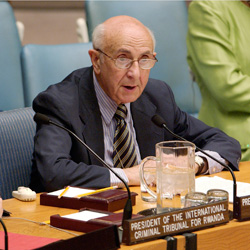| Press Release | PRESIDENT |
(Exclusively for the use of the media. Not an official document)
VE/CS/1465e
 |
| Judge Theodor Meron, ICTY President |
The Tribunal’s President, Judge Theodor Meron, addressed the United Nations Security Council today to provide an update on the achievements and work of the Tribunal and the efforts undertaken to ensure that the Tribunal completes its work in an expeditious manner. In his first address to the Security Council since assuming the position of President in November 2011, President Meron highlighted the support the Tribunal requires to ensure successful completion of its work, and brought a number of pressing matters, including that of staff retention, to the Security Council’s attention.
President Meron paid tribute to the achievements of his predecessor, Judge Patrick Robinson, adding that he “significantly strengthened the ICTY.” In particular, President Meron commended Judge Robinson’s initiative in establishing a Victim’s Trust Fund.
The President brought to the Security Council’s attention the significant successes achieved by the Tribunal, in particular the recent arrests of Goran Hadžić and Ratko Mladić. He underscored that these arrests mean that the Tribunal has arrested all living individuals indicted for substantive offences under the Statute. The President also highlighted the Tribunal’s contribution to the development of international criminal law and assistance to the national judiciaries in the former Yugoslavia.
Turning to the current state of affairs at the Tribunal, the President assured the Security Council that “[t]he Tribunal continues to work as rapidly as possible, given the constraints imposed by limited resources and the need to assure the highest standards of procedural fairness.”
Of the 15 cases currently ongoing, two are in a pre-trial phase, seven at trial, and six at the appeal stage. The President informed the Security Council that trial judgements in the cases of Prlić et al., Vojislav Šešelj, Stanišić and Simatović, Stanišić and Župljanin, Tolimir, and Haradinaj et al. will be issued in 2012, and that the judgement in the case of Radovan Karadžić should be rendered during 2014. The appeals judgement in the Lukić and Lukić case is expected to be delivered in 2012, with a further five appeals judgements.
With respect to the trials of Ratko Mladić and Goran Hadžić, the President assured the Security Council that “[a]ll efforts will be made to complete their trials prior to December 2014” and that the appeals proceedings will be conducted by the Residual Mechanism.
The President informed the Security Council of specific measures he has adopted to accelerate the work of the Tribunal, especially with regards to appeals. Having identified the translation of judgements as an impediment to a timely appellate process, the President has instructed the Registrar to take all necessary measures so as to reduce the translation time in certain cases by 50%.
A second measure which the President is considering relates to minimising the disruption caused by contempt proceedings to the Tribunal’s caseload. The President indicated that, absent an objection by the Security Council, he would assign ad litem judges to sit on any contempt cases, including those not ancillary to their trials.
Turning to the critical matter of staff retention, the President underscored that the issue of staff retention was “[a]nother serious matter that may severely impact the efficiency of our proceedings”. The President observed that while the Security Council had requested that the Secretariat assist the Tribunal in addressing this challenge, no progress had been made in recent meetings with regard to “our modest proposals for a retention bonus in the form of a small termination indemnity”.
Drawing the Security Council’s attention to the difficulty in finding additional places appropriate for convicted persons to serve their sentences, the President asked the Security Council to reiterate its request to states to cooperate with the Tribunal on matters relating to the enforcement of sentences.
Regarding the Residual Mechanism, the President assured the Security Council that he is “personally committed to making the transition to the Residual Mechanism and its functioning as smooth as possible.”
In conclusion, President Meron said he was honoured to be able to serve for a second time as President of the ICTY and said: “While the Tribunal will soon cease to exist, it will leave a world transformed, and its legacy will be an indelible testament to the international community’s commitment to justice: the noblest of human ideals.”
*****
The full text of the President's speech can be found at:
In English
In French
The latest Completion Strategy Report can be found at:
In English
In French
Archive of all speeches made by the Tribunal’s Principals
*****
International Criminal Tribunal for the former Yugoslavia
For more information, please contact our Media Office in The Hague
Tel.: +31-70-512-8752; 512-5343; 512-5356 Fax: +31-70-512-5355 - Email: press [at] icty.org ()
Follow ICTY on Twitter and Youtube

